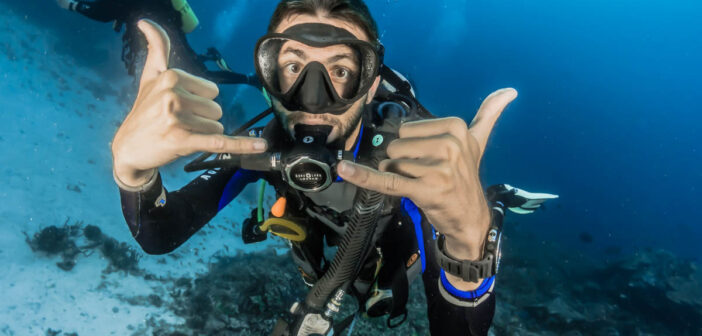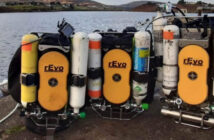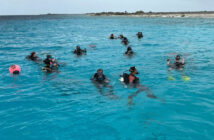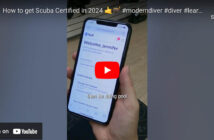I enjoyed reading Kai Steinbeck’s recent piece in The Scuba News explaining which agency offers the best opportunities to a diver who wishes to become a dive instructor and then: “travel the world and teach scuba diving.” His point of view was interesting and got me thinking. And so, here are some of those thoughts. It’s important to understand, this is not a rebuttal, nor is it a criticism. You might think of it as Part 2 following on from his editorial, but by another writer. Alternatively, this is just another dive professional’s point of view informed by a different experience. Your choice.
But before that and following Kai’s example of providing a disclaimer, the “bit of housekeeping” with which he began his article, let’s start here with mine.
By way of full disclosure, I was an active technical instructor-trainer, IT examiner, member of the training advisory board, and a staff member for TDI when Bret Gilliam opened that agency in the early 1990s. I am now a partner in Dive RAID International. I retired from teaching a couple of years back, and essentially only dive for fun now… mostly in caves. But as Vice-president Marketing for RAID, I feel comfortable putting forward a quite different perspective on the state of the industry: specifically, the pathway to becoming a professional dive instructor. I believe Kai’s article, as detailed as it was, missed a few salient points and outlining those gaps here now may help anyone cuddling up to the notion of travelling the world and teaching scuba diving.
While it is true that in theory all the major recreational training agencies—specifically the so-called Big Seven—follow industry-wide course standards and shared goals designed to deliver similar results for the student, there are loopholes. One of the biggest is how an agency polices it’s professional membership whose job it is to apply those general standards when working with students, and how each agency’s goals (part of its business model) affect that process.
Let’s start with Kai’s statement: “… by the time you have completed the open water, advanced, rescue and divemaster course you should possess the theoretical knowledge and have the diving skills to be comfortable in your instructor development course.”
Once again, the theory is rock-solid. Every instructor candidate should possess the required skills, values, and experience, but the reality is very different. At the core of that difference is a divergence in the professional development pathway created by each agency.
The different approaches detailing how an agency makes sure its leaders follow standards, is worth checking into. Does dive agency ABCD ask every student to give feedback before issuing the cert or is the QA process more or less ad-hoc? This is critical knowledge for an instructor.
There is a common diving aphorism that it’s the instructor and not the agency that matters. This is an awful oversimplification. While it’s true that there needs to be good chemistry between instructor and student at every level, at the base of that equation is the original choice the certifying instructor made about which agency to partner with when starting their career. Part was a pure business decision but he or she also had to consider the agency’s beliefs, its ideology, principles, and reputation: and there’s more to that than market share. Most importantly, if one’s goal is to made scuba instruction a job or even just a part-time side hustle, reputation management has to be a consideration if the business is to be truly successful and a happy place to work in.
Something to think about, if you’re thinking about becoming a dive pro in my opinion.
By the way, and for the record, at last count there are around 120 scuba certification agencies. And a good guess is that some are easier than others for an instructor to work with. Wouldn’t it be great to have a crib sheet detailing that sort of thing to hand to anyone thinking about signing up for instructor training? Can you imagine how long that list of pros and cons would be. But as Kai pointed out, research the practical options. You will almost inevitably end with a list narrowed down to the aforementioned Big Seven whose focus is on recreational instruction (BSAC, CMAS, NAUI, PADI, RAID, SDI, and SSI**). Between them, these companies reportedly own about 94 percent of the market and certify that percentage or better of the divers who go on to become scuba and freediving instructors.
This group of companies are certainly not the same. They are all for-profit companies, so that’s something they have in common. Outside of that, each has different challenges when it comes to reputation management and what a prospective instructor should think about when considering which of them to partner with.
For example, at least one of them has a business model that fast-tracks the process of taking a punter off the street, getting them into a brief zero-to-hero open water course, and directing them into an instructor program in the shortest time possible. They make money, a lot of it, from the annual subscription fees collected from their instructors. Whether those professionals are actively teaching or not is essentially secondary. For this agency, it’s a numbers game and those numbers include an active and relentless churn-rate of open water scuba instructors.
This approach to instructor development has damaged the scuba industry, and thinned, diluted the average capacity of a “dive professional” to manage student needs. Empathy, wisdom, a willingness to listen and process an individual’s strengths and weaknesses, are not encouraged if one follows this model. The capacity to teach has been replaced by the need to throw more bodies into the meat grinder. A pessimistic view perhaps… a little out of touch with the reality of doing business?
Anyone who has been reading posts on one of the many active scuba chat groups has seen the posts that go something like: “I’ve just learned to dive; I want to be an instructor; can I log the prerequisite dives in the quarry next weekend?” In my opinion, this is a travesty. Let’s encourage the enthusiasm with vigour but let’s promote common-sense and a more prudent mindset. Most urgently, let’s get away from overpopulating the industry with ill-prepared and poorly experienced leadership.
Dear wanna-be instructor, give this serious thought, please.
My practice—perhaps over-wrought and too old-school—was always asking students who wanted to become an instructor what they had to contribute to the scuba diving zeitgeist. So, for me at least, rather than simplifying the recruitment message and boiling it down to where one can get a job, with whom, and via which flavour of certifying agency, as Kai did, there is something more important to consider.
John Kennedy famously said: “Ask not what your country can do for you: ask what you can do for your country!” I don’t think it’s disingenuous to suggest we give a similar consideration to the dive industry when we want to join it. For example, when running instructor programs, one of the workshops I included focused on the extra value, the experience, the life skills as well as teaching and diving skills, instructor candidates brought to the table. And specifically, how their students would benefit?
Answers from instructor candidates in those workshops ranged from having an advanced degree in phycology, holding an Olympic medal in downhill skiing, and speaking a handful of languages (including one candidate who spoke English, Hindi, Tamal, French, Portuguese, and Arabic), all the way along the skills spectrum to holding a master mariner’s certification, and being an experienced marine-diesel mechanic. Those skills added value to the instructor candidates… and helped to keep the person delivering the IDP—the author—humble.
Yes, by all means strive to teach scuba, but what are you bringing to the table? What is going to set you apart from the others?
Another proviso that anyone reading Kai’s article should not overlook, is that being an instructor “overseas” (that is, holding a passport from a different country to the one where one wants to work), requires a chat with a bureaucrat… perhaps several… and if things work out, carrying a work-permit. (And even then there is not an absolute guarantee of safe passage!)
Anyhow, it’s time to wrap this up, but I do want to thank Kai for taking the trouble to put his article together. It certainly got me thinking, I hope is did the same for you too.
Most of all, I do not want to discourage anyone with aspirations of traveling the world and turning on crowds of tourists and visiting backpackers to the joys of diving. Far from it. DO IT! This industry needs new blood and a new outlook. And for the record, teaching scuba is one of the most interesting and engaging jobs for anyone who is even remotely interested in people watching or who wants to find out more about the human condition and this planet of ours (more than 70 percent of which is covered in water don’t forget.) Being a dive leader is the most rewarding experience. It’s just that the process requires a little more thought than a casual reader of Kai’s article may have given it.
Remember what the late president Kennedy said. Oh, and one skill you should consider developing BEFORE you sign up for instructor training is herding cats.
*RAID uses the term IDP (Instructor Development Program) rather than IDC but that semantics and rather unimportant. I just wanted to add footnotes.
**And incidentally, Kia mentioned GUE in his article and I left that agency off the list for a couple of reasons: they are a not-for-profit training agency closely allied to a for-profit equipment manufacturing company, which is a rather unique business model; but also their focus is not primarily on recreational certifications.
N.B. The views expressed in this thought paper are those of the author, Steve Lewis, and do not necessarily represent those of Dive RAID International, its leadership team or its representatives around the world.









